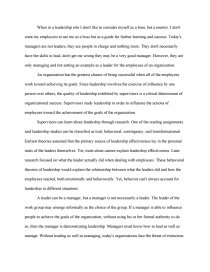Leadership
Essay by review • January 4, 2011 • Essay • 594 Words (3 Pages) • 1,080 Views
When in a leadership role I don't like to consider myself as a boss, but a mentor. I don't want my employees to see me as a boss but as a guide for further learning and success. Today's managers are not leaders, they are people in charge and nothing more. They don't necessarily have the skills to lead, don't get me wrong they may be a very good manager. However, they are only managing and not setting an example as a leader for the employees of an organization.
An organization has the greatest chance of being successful when all of the employees work toward achieving its goals. Since leadership involves the exercise of influence by one person over others, the quality of leadership exhibited by supervisors is a critical determinant of organizational success. Supervisors study leadership in order to influence the actions of employees toward the achievement of the goals of the organization.
Supervisors can learn about leadership through research. One of the reading assignments said leadership studies can be classified as trait, behavioral, contingency, and transformational. Earliest theories assumed that the primary source of leadership effectiveness lay in the personal traits of the leaders themselves. Yet, traits alone cannot explain leadership effectiveness. Later research focused on what the leader actually did when dealing with employees. These behavioral theories of leadership would explain the relationship between what the leaders did and how the employees reacted, both emotionally and behaviorally. Yet, behavior can't always account for leadership in different situations.
A leader can be a manager, but a manager is not necessarily a leader. The leader of the work group may emerge informally as the choice of the group. If a manager is able to influence people to achieve the goals of the organization, without using his or her formal authority to do so, then the manager is demonstrating leadership. Managers must know how to lead as well as manage. Without leading as well as managing, today's organizations face the threat of extinction. Management is the process of setting and achieving the goals of the organization through the functions of management: planning, organizing, directing (or leading), and controlling. A manager is hired by the organization and is given formal authority to direct the activity of others in fulfilling organization goals. Thus, leading is a major part of a manager's
...
...

